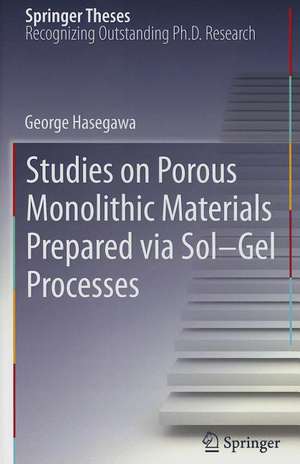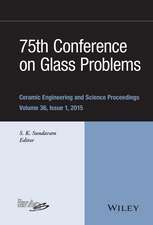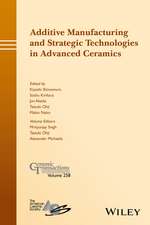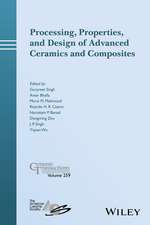Studies on Porous Monolithic Materials Prepared via Sol–Gel Processes: Springer Theses
Autor George Hasegawaen Limba Engleză Hardback – 4 oct 2012
| Toate formatele și edițiile | Preț | Express |
|---|---|---|
| Paperback (1) | 636.80 lei 6-8 săpt. | |
| Springer – 9 noi 2014 | 636.80 lei 6-8 săpt. | |
| Hardback (1) | 640.06 lei 6-8 săpt. | |
| Springer – 4 oct 2012 | 640.06 lei 6-8 săpt. |
Din seria Springer Theses
- 18%
 Preț: 997.88 lei
Preț: 997.88 lei -
 Preț: 389.88 lei
Preț: 389.88 lei - 15%
 Preț: 646.94 lei
Preț: 646.94 lei - 18%
 Preț: 943.43 lei
Preț: 943.43 lei -
 Preț: 399.29 lei
Preț: 399.29 lei - 18%
 Preț: 944.99 lei
Preț: 944.99 lei - 15%
 Preț: 636.80 lei
Preț: 636.80 lei - 18%
 Preț: 941.05 lei
Preț: 941.05 lei - 15%
 Preț: 643.16 lei
Preț: 643.16 lei - 15%
 Preț: 642.68 lei
Preț: 642.68 lei - 18%
 Preț: 1103.62 lei
Preț: 1103.62 lei - 20%
 Preț: 558.83 lei
Preț: 558.83 lei - 18%
 Preț: 1112.30 lei
Preț: 1112.30 lei - 18%
 Preț: 944.19 lei
Preț: 944.19 lei - 18%
 Preț: 1109.92 lei
Preț: 1109.92 lei - 18%
 Preț: 1217.27 lei
Preț: 1217.27 lei - 15%
 Preț: 640.06 lei
Preț: 640.06 lei - 15%
 Preț: 636.45 lei
Preț: 636.45 lei - 15%
 Preț: 640.06 lei
Preț: 640.06 lei - 15%
 Preț: 640.88 lei
Preț: 640.88 lei -
 Preț: 389.70 lei
Preț: 389.70 lei - 20%
 Preț: 563.91 lei
Preț: 563.91 lei -
 Preț: 393.35 lei
Preț: 393.35 lei - 15%
 Preț: 637.93 lei
Preț: 637.93 lei - 15%
 Preț: 641.85 lei
Preț: 641.85 lei - 18%
 Preț: 1225.94 lei
Preț: 1225.94 lei - 20%
 Preț: 551.36 lei
Preț: 551.36 lei - 18%
 Preț: 1229.10 lei
Preț: 1229.10 lei - 15%
 Preț: 639.25 lei
Preț: 639.25 lei - 18%
 Preț: 999.45 lei
Preț: 999.45 lei - 15%
 Preț: 640.06 lei
Preț: 640.06 lei - 18%
 Preț: 1220.45 lei
Preț: 1220.45 lei - 18%
 Preț: 1116.26 lei
Preț: 1116.26 lei - 18%
 Preț: 1110.72 lei
Preț: 1110.72 lei - 18%
 Preț: 1000.87 lei
Preț: 1000.87 lei - 18%
 Preț: 891.17 lei
Preț: 891.17 lei - 15%
 Preț: 640.06 lei
Preț: 640.06 lei - 5%
 Preț: 1154.07 lei
Preț: 1154.07 lei - 15%
 Preț: 635.96 lei
Preț: 635.96 lei - 15%
 Preț: 640.88 lei
Preț: 640.88 lei -
 Preț: 387.20 lei
Preț: 387.20 lei - 18%
 Preț: 1109.92 lei
Preț: 1109.92 lei -
 Preț: 385.25 lei
Preț: 385.25 lei -
 Preț: 385.25 lei
Preț: 385.25 lei - 18%
 Preț: 1112.30 lei
Preț: 1112.30 lei - 18%
 Preț: 999.45 lei
Preț: 999.45 lei -
 Preț: 386.99 lei
Preț: 386.99 lei - 15%
 Preț: 637.13 lei
Preț: 637.13 lei - 20%
 Preț: 554.21 lei
Preț: 554.21 lei - 20%
 Preț: 555.59 lei
Preț: 555.59 lei
Preț: 640.06 lei
Preț vechi: 753.01 lei
-15% Nou
Puncte Express: 960
Preț estimativ în valută:
122.49€ • 133.01$ • 102.89£
122.49€ • 133.01$ • 102.89£
Carte tipărită la comandă
Livrare economică 22 aprilie-06 mai
Preluare comenzi: 021 569.72.76
Specificații
ISBN-13: 9784431541974
ISBN-10: 4431541977
Pagini: 224
Ilustrații: XVI, 208 p.
Dimensiuni: 155 x 235 x 18 mm
Greutate: 0.41 kg
Ediția:2013
Editura: Springer
Colecția Springer
Seria Springer Theses
Locul publicării:Tokyo, Japan
ISBN-10: 4431541977
Pagini: 224
Ilustrații: XVI, 208 p.
Dimensiuni: 155 x 235 x 18 mm
Greutate: 0.41 kg
Ediția:2013
Editura: Springer
Colecția Springer
Seria Springer Theses
Locul publicării:Tokyo, Japan
Public țintă
ResearchCuprins
From the Contents: General Introduction.- Pore Formation in Poly(divinylbenzene) Networks Derived from Organotellurium-Mediated Living Radical Polymerization.- Extension of Living Radical Polymerization Accompanied by Phase Separation to Methacrylate- and Acrylamide-based Polymer Monoliths.- Novel Monolithic Capillary Column with Well-Defined Macropores Based on Poly(styrene-co-divinylbenzene).- Fabrication of Activated Carbon Monoliths with Well-defined Macropores Derived from Sulfonated Poly(divinylbenzene) Networks.- Monolithic Electrode for Electric Double-Layer Capacitors Based on Macro/Meso/Microporous S-Containing Activated Carbon with High Surface Area.- Facile Preparation of Transparent Monolithic TiO2 Gels Utilizing Chelating Ligand and Mineral Salts.- Novel and Facile Preparation of Hierarchically Porous TiO2 Monoliths.- Application of Hierarchically Porous Titania Monoliths to Chromatographic Separation Media.- Arylene-bridged Polysilsesquioxane Monoliths with Multi-Scale Porous Structure Prepared via Sol–Gel Process Followed by Hydrothermal Treatment.- Fabrication of Macroporous SiC and SiC/C Monoliths from Arylene-Bridged Polysilsesquioxanes via Carbothermal Reduction.-Hierarchically Porous Carbon Monoliths with High Surface Area from Arylene-Bridged Polysilsesquioxanes without Thermal Activation Process-. Facile Preparation of Monolithic LiFePO4/Carbon Composites with Well-Defined Macropores for Li-ion Battery.- General Summary.
Notă biografică
Dr. George Hasegawa
Department of Energy and Hydrocarbon Chemistry,
Graduate School of Engineering, Kyoto University
Department of Energy and Hydrocarbon Chemistry,
Graduate School of Engineering, Kyoto University
Textul de pe ultima copertă
This thesis focuses on porous monolithic materials that are not in the forms of particles, fibers, or films. In particular, the synthetic strategy of porous monolithic materials via the sol–gel method accompanied by phase separation, which is characterized as the non-templating method for tailoring well-defined macropores, is described from the basics to actual synthesis. Porous materials are attracting more and more attention in various fields such as electronics, energy storage, catalysis, sensing, adsorbents, biomedical science, and separation science. To date, many efforts have been made to synthesize porous materials in various chemical compositions—organics, inorganics including metals, glasses and ceramics, and organic-inorganic hybrids. Also demonstrated in this thesis are the potential applications of synthesized porous monolithic materials to separation media as well as to electrodes for electric double-layer capacitors (EDLCs) and Li-ion batteries (LIBs). This work is ideal for graduate students in materials science and is also useful to engineers or scientists seeking basic knowledge of porous monolithic materials.
Caracteristici
Was named best-in-department thesis (Chemistry, 2012) from the Graduate School of Science, Kyoto University Presents state-of-the-art porous monoliths based on various chemical compositions (organic, inorganic, and organic–inorganic hybrid materials) fabricated via the sol–gel method accompanied by phase separation Includes many electron micrographs, helping general readers to understand the pore structures of the materials





